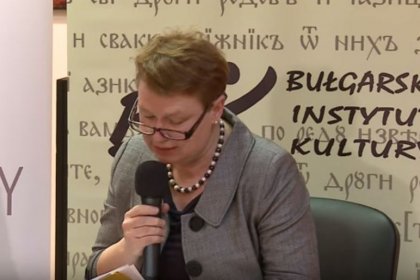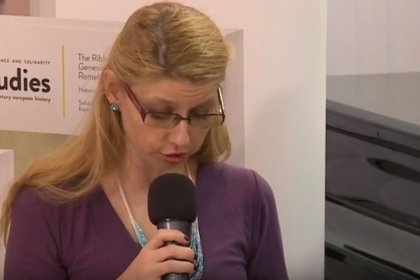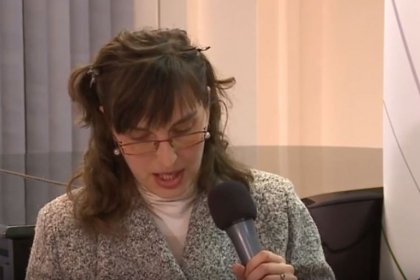The goal of the seminars held within the Genealogies of Memory seminars has been two-fold: to define the specificity of Central and Eastern Europe as regards history and memory, as well as to see the latest developments in the region in a broader European and global context.
About Genealogies of Memory Seminars
2012 - 2017, Warsaw
Japanese Perspectives on Memory in Central and Eastern Europe
Participants:
Kenshi Fukumoto (Kwansei Gakuin University), Reading the Texts of Tadeusz Isakowicz-Zaleski
Kenshi Fukumoto is Assistant Professor at Kwansei Gakuin University. Now he is preparing doctoral thesis, "Medical Doctors Toward Social and Ethnic Problems in Poland 1905-1919". Recently he has published Robotnicy Łodzi drugiej połowy XIX wieku. Nowe kierunki badawcze (Wydawnictwo Uniwersytetu Łódzkiego, 2017), with Kamil Śmiechowski and Marta Sikorska-Kowalska. He is also researching the discourse over 'the massacres in Volhynia' in 1943 to analyze the relationship between Poland, Ukraine and Russia in memory politics.
Hisashi Shigematsu (University of Tokyo), Evaluations Unsettled: Historical Views of the Genocide Centre and the International Commission in Lithuania
Hisashi Shigematsu is a doctoral student at the Graduate School of Arts and Sciences, the University of Tokyo. He specializes in modern and contemporary history of Lithuania and area studies. He is now writing a Ph.D. dissertation dealing with political movements and Jewish minority in Lithuania from the 1930s to the 1940s.
Commentators: Dr Zuzanna Bogumił, Institute of Philosophy and Sociology APS, Prof. Dr hab. Tomasz Stryjek, Collegium Civitas, Dr Joanna Wawrzyniak, Institute of Sociology UW
Chair: Dr hab. Małgorzata Głowacka-Grajper
Date and venue: 19 September 2017, Polish Academy of Sciences, Warsaw
Organisers: Małgorzata Głowacka-Grajper (IS UW), Małgorzata Pakier (ENRS), Joanna Wawrzyniak (IS UW), Karolina Wigura (IS UW)
The Genealogies of Memory seminars are organised by Social Memory Laboratory of Institute of Sociology UW and European Network Remembrance and Solidarity
Post-War War Panics. Poland 1945-1980
We invite you to the next seminar within the Genealogies of Memory series, which will take place in Warsaw on 19 January. A presentation will be given by Marcin Zaremba.
Zaremba will discuss war panics in Poland between 1945 and 1980. His speech will be followed by a discussion with Antoni Sułek and Joanna Wawrzyniak chaired by Małgorzata Pakier.
Date and venue: 19 January 2017, Institute of Sociology University of Warsaw
Organisers: Małgorzata Głowacka-Grajper (IS UW), Małgorzata Pakier (POLIN Museum), Joanna Wawrzyniak (IS UW), Karolina Wigura (IS UW)
Partner institutions: Social Memory Laboratory, Institute of Sociology University of Warsaw; European Network Remembrance and Solidarity; POLIN Museum of the History of Polish Jews
"Multidirectional Memory". Discussion with Prof. Michael Rothberg
Over the past decade, the book "Multidirectional Memory. Remembering the Holocaust in the Age of Decolonization" by Professor Michael Rothberg from the University of California, Los Angeles, was the most widely discussed study devoted to the question of memory. The Polish translation of the book was published by Wydawnictwo Instytut Badań Literackich last September.
The author sheds new light on the contemporary cultural memory of the Holocaust by way of numerous parallels – geo-political, cultural and historical. He compares how the Holocaust is remembered in Germany, France, Warsaw, Israel and the United States. He ponders on how this memory is appropriated and transformed by other cultural and ethnic groups in order to commemorate their own history, especially the injustice suffered in the era of colonization.
More importantly, Rothberg rejects the interpretation of the appropriation and references as a rivalry of who suffered more. Instead, he proposes the notion of “multidirectional memory” which appeals to cooperation and solidarity. In light of contemporary debates on multiculturalism, immigrants and integration, as well as the challenges that Europe faces today, the book seems more relevant than ever before.
Will Michael Rothberg’s ideas gain recognition in Poland, internally divided and antagonized over the thorny issue of its own history? The question is all the more telling as Warsaw, the Warsaw Ghetto and the Monument to the Ghetto Heroes all play a significant role in the author’s ruminations.
The participants in our discussion included: Professor Michael Rothberg, Dr Katarzyna Bojarska, culture expert who translated the book into Polish, and Professor Adam Lipszyc from the Polish Academy of Sciences.
Chair: Dr Małgorzata Pakier (POLIN Museum & ENRS).
Date and venue: 14 December 2016, POLIN Museum of the History of Polish Jews
Organisers: POLIN Museum, Social Memory Faculty at the Institute of Sociology of the Warsaw University, European Network Remembrance and Solidarity and Kultura Liberalna
Karolina Wigura at the Genealogies of Memory Seminar
Karolina Wigura holds an adiunkt position at the Institute of Sociology at University of Warsaw. She is also the co-director of the "Knowledge Bridges – Poland and the UK" program at St. Anthony's College at Oxford University, as well as the head of Political Section at Kultura Liberalna. Her fields of interest include forgiveness and strong emotions in politics.
Her presentation was followed by commentaries by Zbigniew Stawrowski and Marcin Zaremba.
Date and venue: 24 November 2016, Institute of Sociology University of Warsaw
Organisers: Małgorzata Głowacka-Grajper (IS UW), Małgorzata Pakier (ENRS, POLIN Museum), Joanna Wawrzyniak (IS UW), Karolina Wigura (IS UW)
Partner institutions: Social Memory Laboratory, Institute of Sociology University of Warsaw; European Network Remembrance and Solidarity; POLIN Museum of the History of Polish Jews
Genealogies of Memory seminar 2016
Participants:
Zuzanna Bogumił, Chłopska pamięć wojny – na przykładzie fotografii Feliksa Łukowskiego
Michał Łuczewski, Metoda międzygeneracyjnych badań nad pamięcią. Przykład Żmiącej
Anna Wylegała, Doświadczenie i pamięć: wokół reformy rolnej z 1944 roku
Date and venue: 27 October 2016, Institute of Sociology University of Warsaw
Organisers: Małgorzata Głowacka-Grajper (IS UW), Małgorzata Pakier (POLIN Museum, ENRS), Joanna Wawrzyniak (IS UW), Karolina Wigura (IS UW)
Partner institutions: Social Memory Laboratory, Institute of Sociology University of Warsaw; European Network Remembrance and Solidarity; POLIN Museum of the History of Polish Jews
Memory Practices and Memory Studies in Bulgaria
The seminar concentrated on the recent developments in the field of memory studies in Bulgaria. Researchers from the Institute of Ethnology and Folklore Studies, Bulgarian Academy of Sciences presented the methodological approaches in the memory studies in Bulgaria, dealings with communism in Bulgarian social sciences as well as the case study on collectivization from the memory perspective.
Watch videorecording on-line
Participants:
Ana Luleva (Bulgarian Academy of Sciences), Memory Studies in Bulgaria: Institutions and Approaches
Zlatina Bogdanova (Bulgarian Academy of Sciences), Communism in Memory Studies – the Bulgarian Perspective
Yana Yancheva (European Humanities University), Agricultural collectivization (1940-s – 1950-s) in Bulgarian Memory Studies
Commentators: Grażyna Szwat-Gyłybowa (Institute of Slavic Studies, Polish Academy of Sciences); Małgorzata Pakier (POLIN Museum, ENRS)
Date and venue: 28 November 2014, Bulgarian Cultural Institute, Warsaw
New Research on Memory in Eastern Europe (Ukraine and Belarus)
Aim of the workshop was to discuss specificity of the collective memory and research of that memory in Belarus and Ukraine. Memory in Eastern Europe very often equals trauma because of its experience of 20th century two totalitarianisms, genocide, displacement and border changes. What links Ukraine and Belarus in this context is several decades of disruption of the collective memory mechanisms and discontinuance of the identity, caused by the totalitarian political system, blocking transfer of memory. After collapse of the Soviet Union, memory in both countries was suddenly released; new, alternative visions of the past, new national heroes, new victims, and new conflicts and “memory wars” appeared.
During this workshop young scholars from several countries presented their ongoing research projects. The meeting brought together new research on memory and discuss specificity of the Eastern European post-totalitarian memory, but also reflected on methodology and integrate scholars from various countries.
Watch chosen speeches on-line
Date and venue: 10-11 June 2014, Staszic Palace, Nowy Świat 72 street, Warsaw
Organisers: European Network Remembrance and Solidarity and Centre for Advanced Research in Humanities and Social Sciences (Institute of Philosophy and Sociology, Polish Academy of Sciences and Institute of Sociology, University of Warsaw)
History, Memory, Politics. New Perspectives from the Baltic Region
The seminar presented new perspectives on history, memory and politics from the Baltic region. Post-World War Two and post-Soviet memories of the Baltic societies were viewed in the context of current developments in European and East European regional politics, including the recent Crimean crisis.
Watch videorecording on-line
Participants:
Martins Kaprans (University of Tartu), The institutionalization of social memory research in Latvia
Heiko Pääbo (University of Tartu), Holocaust narrative in Estonian history textbooks
Felix Ackermann (European Humanities University), Repercussions of the Grand Duchy? The public perception of the Ukrainian Crisis in Lithuania and Belarus
Commentator: Marcin Niemojewski (University of Warsaw)
Chair: Małgorzata Pakier (POLIN Museum, ENRS)
Date and venue: 15 May 2014, University of Warsaw Library
Social Memory and Politics in Contemporary Russia
The seminar was devoted to the state of memory studies in Russia, main directions and outcomes of sociological research on memory as well as political context of studying past in Russia.
Watch videorecording on-line in Polish
Participants:
Alexey Levinson – sociologist from Yuri Levada Analytical Center, researcher of social memory in Russia
Alexey Miller – historian, professor in Russian Academy of Sciences and Central European University, expert in memory politics and historiography in Central and Eastern Europe Commentary
Włodzimierz Borodziej – historian, professor University of Warsaw, director of the Imre Kertész Kolleg Jena
Moderation: Sławomir Dębski – director of the Centre for Polish-Russian Dialogue and Understanding
The seminar was co-organized with the Centre for Polish-Russian Dialogue and Understanding
Political contexts of social memory in contemporary Ukraine
Paper by Dr Olga Wolaniuk (National Pedagogical University in Kiev, Nation’s Memory Institute in Ukraine): Memory studies in contemporary Ukraine: methodology and socio-political contexts
Discussion: Dr Tomasz Stryjek, Dr Joanna Konieczna-Sałamatin
Chair: Dr Małgorzata Głowacka-Grajper
Participants:
Dr Olga Wolaniuk works in the Nation’s Memory Institute in Kiev. In 2012 she defended her PhD entitled „Social memory in the context of the development of political awareness in contemporary Ukraine”. Her research interests include: social memory in Ukraine, construction and development of democratic political culture in Ukraine, Western and Eastern political studies.
Dr Tomasz Stryjek works in the Institute of Political Studies of Polish Academy of Sciences, where he defended his PhD on Ukrainian nation-building ideology in the period from 1918 to 1939. He is also a lecturer of John Paul II Catholic University of Lublin. He published different works on the interpretations of the past in public debate in Ukraine and Ukrainian political ideologies.
Dr Joanna Konieczna-Sałamatin is a lecturer in the Institute of Sociology, University of Warsaw and Collegium Civitas. Her research interests include political cultures of Poland and Eastern Europe and the development of civil society in Poland and Eastern Europe. She cooperates with various NGOs and public institutions.
Date and venue: 24 May 2013, History Meeting House, Warsaw
Remembering Katyń
The third seminar from “Genealogies of Memory” series took place in March 2013 in Warsaw. Invited guests of the seminar presented the results of the “Memory at War. Cultural Dynamics in Polan, Russia and Ukraine” research project led by the University of Cambridge. The main aim of the seminar was to discuss the recently published book “Remembering Katyn” (Etkind, Finnin et al., Polity Press 2012).
The book “Remembering Katyn”, which explores the legacy of Katyn through the memory cultures of seven countries: Belarus, Poland, Russia, Ukraine and the Baltic States, is a perfect example of the collaborative, analytical work describing the Eastern European social memory processes.
Watch videorecording on-line
Invited guests of the seminar, participants of “Memory at War” research team:
dr Uilleam Blacker – his interests include researching remembrance, literature and urban space in Poland, Russia and Ukraine
Simon Lewis – author of a doctoral thesis analysing the impact of a painful past in contemporary Belarusian literature
dr Matilda Mroz – resarcher of cinema and visual arts
dr Rory Finnin – researcher of the relation between literature and national identity in the Ukraine, social memory and nationalism
French Memory Studies
The second seminar in 2012 organized by Genealogies of Memory team dealt with the French tradition of memory studies.
The seminar was held on Saturday, 20 October 2012 in Warsaw University Library.
During the seminar, researchers from Centre National de la Recherche Scientifique – Marie Claire Lavabre and Sarah Gensburger – presented their papers on the politics of collective memory in France. Paweł Rodak from Warsaw University commented on the main thoughts of the presentation, followed by a lively discussion.
Nordic Memory Studies
The seminar devoted to memory studies in Nordic region is part of an introduction to the conference “Regions of Memory”. Its aim was to show the regional diversity of memory studies throughout Europe. The researchers from Nordic Network in Memory Studies presented their papers on some aspects of collective memory in Sweden, Finland, Denmark and Norway.
Speakers:
Barbara Törnquist-Plewa (Lund University), Nordic Memory Studies
John Sundholm (Karlstad University), Finland at War on Screen since 1989: Affirmative Historiography and Prosthetic Memory
Hans-Jorgen Wallin Weihe (University of Stavanger), The Importance of Making the Invisible Visible. The Case of the Invisible Jews of Gudbrandsdal and Lillehammer
Kristian Nilsson (Lund University), Remembering Alien Encounters: Gösta Carlsson and the UFO-monument in Ängelholm, Sweden
Commentator: Joerg Hackmann (University of Szczecin)
Chair: Małgorzata Pakier (POLIN Museum, ENRS)
Date and venue: Friday, 28 September 2012, Warsaw University Library
Read about the project
Read More



